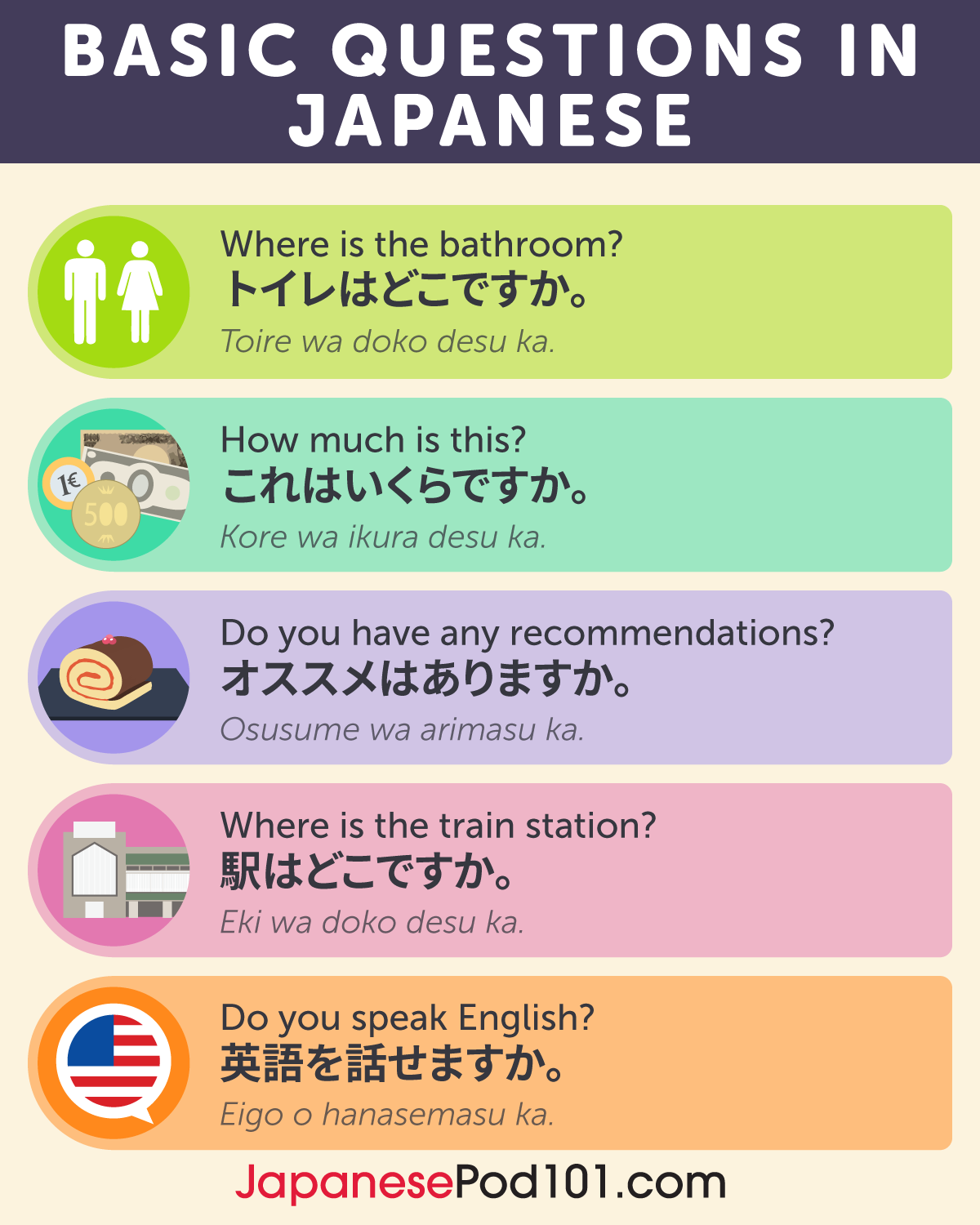
Pronouns are used to substitute nouns, such as people or things, in a sentence. Using pronouns allows you to avoid repetitive usage of a particular word in a sentence, which would sound awkward. Japanese pronouns are very different from those in English because Japanese pronouns can be omitted from a sentence when they’re implied through the context.
Unlike in English, there are many different variations of Japanese personal pronouns that translate as “I/me” and “you,” although only a few are commonly used. This expression of Japanese pronouns comes from Japanese culture, which puts importance on respect, seniority, and social order.
Each Japanese pronoun variation denotes the different characteristics of the speaker. These include gender, age, social status, level of respect, and their relationship with the person they’re speaking to.
Ready to learn Japanese pronouns? In this Japanese pronoun guide, we introduce Japanese pronouns that will boost your language skills, and teach you how to use them. JapanesePod101 makes it simple and easy to understand!
 Table of Contents
Table of Contents
- Japanese Personal Pronouns
- Japanese Demonstrative Pronouns
- Japanese Interrogative Pronouns
- Japanese Indefinite Pronouns
- Examples
- Conclusion: How JapanesePod101 Can Help You Learn More Japanese
1. Japanese Personal Pronouns

Personal pronouns in Japanese are rich in expression, and there are dozens of first- and second-person pronouns. However, most of them aren’t commonly used so we’ll introduce frequently used Japanese personal pronouns here.
1. 1st, 2nd, 3rd Person Singular
1. How to Say “I”
| Reading | Kanji | Hiragana | Level of Formality | Gender | Characteristics |
|---|---|---|---|---|---|
| watakushi | 私 | わたくし | very formal | both | Very formal and polite personal pronoun often used in very official occasions. |
| watashi | 私 | わたし | formal / informal | both | Used by both genders in formal occasions, such as at the workplace. This is the most commonly used word for “I,” but it’s often omitted in a sentence. In informal situations, this is typically used by women. |
| atashi | ー | あたし | informal | female | This is the casual version of watashi and it’s used by younger females in conversations. However, it can sound a bit childish and unsophisticated. |
| boku | 僕 | ぼく | informal | male | Used by males of all ages, but very often by kids and younger men. It gives an impression of humbleness. This can also be used as a second-person pronoun toward little boys (English equivalent: “kid”). |
| ore | 俺 | おれ | very informal | male | Frequently used by men in informal settings, such as among family and friends. It sounds very masculine. This can be very rude when it’s used in formal occasions or in front of respectable/senior people. |
2. How to Say “You”
| Reading | Kanji | Hiragana | Level of Formality | Gender | Characteristics |
|---|---|---|---|---|---|
| anata | 貴方 | あなた | formal / informal | both | This is almost equivalent to the English word “you.” However, it’s not often used as the subject in a sentence, and it’s often omitted. It’s more common to use a person’s name with a Japanese honorific, such as 様 (sama) or さん (san), to express “you” in formal contexts. In addition, wives often call their husbands by this Japanese pronoun. When used this way, it’s comparable to the English words “dear” or “darling.” Kanji is rarely used. |
| kimi | 君 | きみ | informal | both | Often used to call subordinates and peers in informal settings. It can also be affectionate and polite when used by a boyfriend/husband to call his girlfriend/wife. It’s impolite and inappropriate when used with respectable/senior people or strangers. The Kanji 君 can also be read as kun when it’s added next to a male’s name as a casual and affectionate honorific word. |
| omae | お前 | おまえ | very informal | both / male | Often used by men. It expresses that the speaker has a superior status or age, and it’s very rude to use this toward senior people and in formal settings. It’s also used among close friends to call peers. In addition, husbands frequently call their wives by this pronoun, which is comparable to the female use of anata. |
| anta | ー | あんた | very informal | both | It’s a short version of anata, but it sounds very impolite and implies a sense of contempt. It can also be used between people in a very close relationship. It’s very rude and inappropriate to use toward senior people and in formal settings. |
| kisama | 貴様 | きさま | very rude and hostile | both | The historical origin of this word was very formal, but it’s used today as a very rude way to call another person. It has a sense of extreme hostility from the speaker. You’ll often hear this in 時代劇 (jidaigeki) (samurai warrior) drama shows. |

3. How to Say “He” and “She”
Does Japanese have gendered pronouns? Sort of. Here’s what we mean:
| Reading | Kanji | Hiragana | Level of Formality |
|---|---|---|---|
| kare | 彼 | かれ | formal / informal |
| kanojo | 彼女 | かのじょ | formal / informal |
The Japanese pronouns for the third person are above. However, they’re not used like they are in English.
Native Japanese people prefer to use the person’s name, or to describe them as あの人 (ano hito), meaning “that person,” which makes it unnecessary to indicate gender.
In informal settings, 彼 (kare) means “boyfriend” and 彼女 (kanojo) means “girlfriend.”
2. 1st, 2nd, 3rd Person Plural
In order to make Japanese personal pronouns plural, a suffix is added to them.
The suffix can be ~達 (-tachi ), ~方 (-gata), or ~ら (-ra), depending on which word comes in front.
| Meaning | Suffix | Reading | Level of Formality |
|---|---|---|---|
| We | -tachi | watashi-tachi | neutral / formal |
| You [plural] | -tachi | anata-tachi | neutral / formal |
| You [plural] | -gata | anata-gata | formal |
| They [he, plural] | -ra | kare-ra | neutral / formal |
| They [she, plural] | -ra | kanojo-ra | neutral / formal |
The suffix 達 (-tachi) can be added to most of the nouns that refer to people and animals. For example, 動物達(dōbutsu-tachi) means “animals.”

3. Possessive Forms
To make Japanese possessive pronouns, add the suffix の (〜no) to the pronouns.
| Meaning | Reading |
|---|---|
| mine | watashi no |
| yours | anata no |
| his | kare no |
| hers | kanojo no |
| ours | watashi-tachi no |
| theirs | kare-ra no |
4. Reflective or Intensive Forms
To make Japanese reflexive pronouns or intensive forms, add the suffix 自身 (〜jishin) to the pronouns.
| Meaning | Reading |
|---|---|
| myself | watashi jishin |
| yourself | anata jishin |
| himself | kare jishin |
| herself | kanojo jishin |
| ourselves | watashi-tachi jishin |
| themselves | kare-ra jishin |
To hear how to pronounce Japanese pronouns, visit Most Useful Pronouns.
2. Japanese Demonstrative Pronouns

Demonstrative pronouns in Japanese are typically written in Hiragana. Further, Japanese demonstrative pronouns are easy to remember as they’re categorized in groups depending on their degree of distance from the speaker or listener.
Words that:
- begin with こ (ko-) indicate something close to the speaker.
- begin with そ (so-) indicate some distance from the speaker or something close to the listener.
- begin with あ (a-) indicate far distance.
| Meaning | Reading | Hiragana | Notes |
|---|---|---|---|
| this | kore | これ | near speaker |
| it | sore | それ | near listener |
| that | are | あれ | distant from both speaker and listener |
| these | kore-ra | これら | near speaker |
| those | sore-ra / are-ra | それら/ あれら | near listener / distant from both speaker and listener |
| here | koko | ここ | near speaker |
| there | soko | そこ | near listener |
| over there | asoko | あそこ | distant from both speaker and listener |
3. Japanese Interrogative Pronouns
Similar to demonstrative pronouns, most of the Japanese interrogative pronouns begin with ど (do-) or だ (da-).
| Meaning | Reading | Kanji | Hiragana |
|---|---|---|---|
| what | nani | 何 | なに |
| which | dono / dore | ー | どの/どれ |
| who | dare | 誰 | だれ |
| whom | dare ni | 誰に | 誰に |
| whose | dare no | 誰の | だれの |
| when | itsu | ー | いつ |
| why | naze | ー | なぜ |
Keep in mind that “whose” is a possessive form of “who,” and the rules of the Japanese possessive forms also apply:
誰 (dare) meaning “who” + の (〜no) = 誰の (dare no) meaning “whose.”

4. Japanese Indefinite Pronouns
In the Japanese language, “everyone/everybody” and “anyone/anybody” are both translated as 誰でも (dare demo) in some contexts.
In a negative sentence using indefinite pronouns such as “no one/nobody,” “nowhere,” and “nothing,” a negative form is typically: も…ない (...mo…nai …).
| Meaning | Reading | Kanji | Hiragana |
|---|---|---|---|
| everyone / everybody | minna / dare demo | 皆/誰でも | みんな/だれでも |
| everywhere | doko demo / doko ni mo | ー | どこでも/どこにも |
| everything | subete / zenbu | 全て/全部 | すべて/ぜんぶ |
| someone / somebody | dare ka | 誰か | だれか |
| somewhere | doko ka | ー | どこか |
| something | nani ka | 何か | なにか |
| no one / nobody | dare mo…nai | 誰も…ない | だれも…ない |
| nowhere | doko ni mo…nai | ー | どこにも…ない |
| nothing | nani mo…nai | 何も…ない | なにも…ない |
| anyone / anybody | dare demo | 誰でも | だれでも |
| anywhere | doko demo / doko ni mo | ー | どこでも/どこにも |
| anything | nan demo | 何でも | なんでも |

5. Examples
Now that we’ve come to the end of this Japanese pronouns list, here are some example sentences using Japanese pronouns.
1. Personal Pronouns
- あなたと私は東京出身で、彼と彼女は大阪出身です。
Anata to watashi wa Tōkyō shusshin de, kare to kanojo wa Ōsaka shusshin desu.
You and I are from Tokyo, and he and she are from Osaka.
- 年上の人に向かって「お前」や「貴様」と呼ぶことはとても失礼です。
Toshiue no hito ni mukatte “omae” ya “kisama” to yobu koto wa totemo shitsurei desu.
It is very rude to call an elder person omae and kisama.
- 私達は明日、君の誕生日会へ行きます。
Watashi-tachi wa ashita, kimi no tanjōbi kai e ikimasu.
We will go to your birthday party tomorrow.
2. Demonstrative Pronouns
- それをここに持ってきてください。
Sore o koko ni motte kite kudasai.
Please bring it here.
- これらの本はあそこの棚へ戻してください。
Kore-ra no hon wa asoko no tana e modoshite kudasai.
Please put these books back on the shelf over there.
- 彼らはここからあなたの家へ出発しました。
Kare-ra wa koko kara anata no ie e shuppatsu shimashita.
They departed to your home from here.
3. Interrogative Pronouns
- 私はなぜあそこに行かなければならないか分かりません。
Watashi wa naze aoko ni ikanakereba naranai ka wakarimasen.
I don’t understand why I have to go there.
- 誰に向かって話しているのですか。
Dare ni mukatte hanashite iru no desu ka.
To whom are you talking?
- あそこのあの靴は誰のですか。
Asoko no ano kutsu wa dare no desu ka.
Whose shoes are those there?
4. Indefinite Pronouns
- 彼女はどこかに全てを置いてきました。
Kanojo wa doko ka ni subete o oite kimashita.
She left everything somewhere.
- 誰もあのような変な服を持っていないでしょう。
Dare mo ano yō na hen na fuku o motte inai deshō.
No one would have strange clothes like that.
- 誰かが彼にここで何でも食べていいと伝えました。
Dare ka ga kare ni koko de nan demo tabete ii to tsutaemashita.
Somebody told him that he could eat anything here.
To learn more useful Japanese vocabulary, check out our 100 Adjectives and 100 Nouns articles.
6. Conclusion: How JapanesePod101 Can Help You Learn More Japanese

In this article, we introduced you to a variety of common pronouns in Japanese. By now, you should have an enhanced vocabulary and have a better idea of how to use Japanese pronouns. This is something that will definitely improve your overall Japanese language skills!
Did you learn something new from this article? Do you want to know more about Japanese grammar? Let us know in the comments section below!
If you would like to learn more about the Japanese language and other useful Japanese phrases for any situation, you’ll find more helpful content on JapanesePod101.com. We provide a variety of free lessons to help you improve your Japanese language skills.
To get you started, here’s some more information about the basics of Japanese, with audio:
To learn how to converse in Japanese, check out Top 15 Questions You Should Know for Conversations and Top 10 Conversational Phrases. Basic Kanji for Verbs and Basic Kanji for Adjectives are also useful if you want to learn Japanese kanji.
And there’s so much more! Learn faster and enjoy studying Japanese at JapanesePod101.com!










